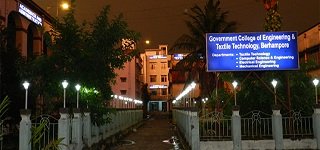
|
GCETTB ( जीसीईटीटीबी ) |

|
GOVERNMENT COLLEGE OF ENGINEERING & TEXTILE TECHNOLOGY, BERHAMPORE ( गवर्नमेंट कॉलेज ऑफ इंजीनियरिंग एंड टेक्सटाइल टेक्नोलॉजी, बेरहामपुर ) GOVT. OF WEST BENGAL | ESTD. 1927 |

|
B.Tech in Electrical Engineering
Electrical engineering is one of the core fields of engineering and it is always evergreen in terms of Scope and Job Prospects. Electrical Engineering is the heart of whole engineering discipline and therefore its scope will never fade. An electrical engineer is required to have education and skills that span a poad range of technical, social, environmental, and economic problems.
Currently there are circuit theory labs, state of the art seminar halls, thermal power engineering labs, electrical machines lab, electronics lab, control system lab etc. The college offers a 4-years course of study leading to B. Tech. Degree in Electrical Engineering.
Program Educational Objectives (PEO)
PEO 1: Stand out or excel in professional career and/or higher education by acquiring knowledge in mathematical, computing and engineering principles.
PEO 2: Study or analyze real life problems, design and utilize machines and methods appropriate to its solutions that are technically sound, economically feasible and socially acceptable.
PEO 3: Show professionalism, ethical attitude, communication skills, team work in their profession and get used to to current trends by engaging in lifelong learning.
Program Outcomes (PO)
Explore More About Us
Institution Info
E Books
Downloads
Contact Us
Govt. College of Engineering & Textile Technology Berhampore
4, Cantonment Road,
P.O- Berhampore
Dist- Murshidabad, West Bengal, India. Pin- 742101
Telephone: 03482 - 351040
Email: gcettb@gmail.com / principal@gcettb.ac.in








